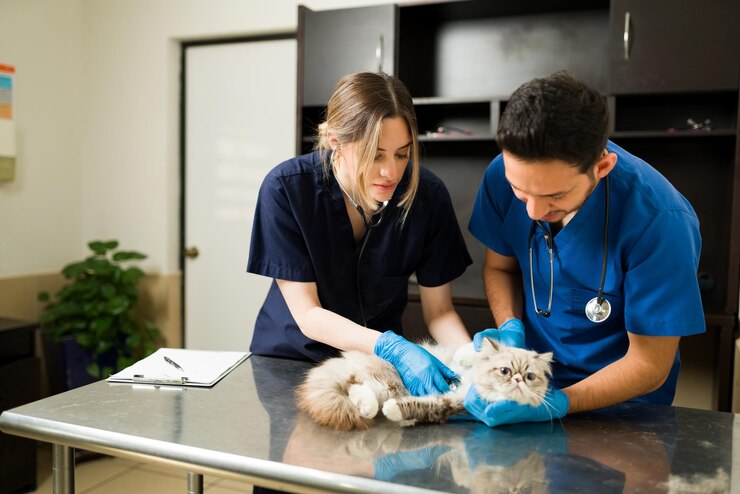Learn how to detect early signs of illness in pets to ensure timely treatment. Identify common symptoms in dogs and cats with this expert guide for healthier pets.
How to Detect Early Signs of Illness in Pets

As a pet owner, your furry companion’s health is a top priority. Detecting early signs of illness can make a significant difference in ensuring timely treatment and recovery. Pets can’t communicate their discomfort the way humans do, so understanding subtle behavioral and physical changes is key to identifying potential health problems.
This artice will tell you about the common symptoms in dogs and cats, tips for observing your pet’s health, and how to take action when you notice something is off.
Why Is Early Detection Important?
Early detection of illness in pets can:
- Prevent serious health complications
- Reduce treatment costs
- Enhance your pet’s quality of life
- Increase the chances of a full recovery
By recognizing the first signs of illness, you can seek veterinary care before the condition worsens, ensuring a quicker and more effective treatment.
Common Early Signs of Illness in Pets

1. Changes in Appetite or Thirst
A sudden increase or decrease in your pet’s appetite or water intake can be a sign of underlying health issues. Dogs or cats that stop eating entirely or drink excessively may be dealing with conditions like kidney disease, diabetes, or digestive problems.
2. Lethargy and Decreased Activity
If your normally energetic pet becomes unusually tired or less active, it may indicate illness. Lethargy can be associated with various conditions, including infections, pain, or anemia.
3. Unusual Behavior or Mood Changes
Changes in behavior, such as increased aggression, anxiety, or withdrawal, may be your pet’s way of expressing discomfort or pain. Monitor for signs like:
- Irritability
- Restlessness
- Excessive hiding
4. Vomiting and Diarrhea
Occasional vomiting or diarrhea may not be a cause for concern, but persistent symptoms can indicate more serious conditions such as gastrointestinal infections, parasites, or food intolerance.
5. Respiratory Issues
Signs of respiratory problems can include:
- Coughing
- Sneezing
- Labored breathing
- Nasal discharge
These symptoms could be linked to conditions like respiratory infections, allergies, or heart disease.
6. Skin and Coat Changes
Pay attention to changes in your pet’s skin and coat. Common signs include:
- Itching or scratching
- Redness or inflammation
- Hair loss or dull coat
These may indicate allergies, parasites, or skin infections.
7. Weight Loss or Gain
Sudden, unexplained weight changes can be a sign of serious health issues such as thyroid problems, cancer, or metabolic disorders.
8. Eye and Ear Abnormalities
Watch for symptoms such as:
- Red, watery, or cloudy eyes
- Discharge from the ears
- Frequent ear scratching
These could indicate infections, allergies, or foreign objects in the eyes or ears.
9. Urinary and Bowel Changes
Monitor your pet for:
- Frequent urination
- Straining to urinate or defecate
- Blood in urine or stool
These symptoms can be linked to urinary tract infections (UTIs), bladder stones, or intestinal issues.
10. Bad Breath or Dental Issues
Foul breath, difficulty eating, or excessive drooling may indicate dental disease, gum infections, or oral tumors. Regular dental check-ups can help prevent serious complications.
When to Contact a Veterinarian
If you notice any of these early signs of illness, it’s best to consult your veterinarian. Some symptoms may seem minor but can escalate quickly without proper care.
- Persistent symptoms for more than 24-48 hours
- Severe pain or distress
- Sudden collapse or seizures
Early intervention can prevent minor issues from becoming life-threatening conditions.
Preventive Measures to Keep Your Pet Healthy
- Regular Vet Check-ups: Routine exams help catch problems early.
- Balanced Diet: Provide a well-balanced, nutritious diet.
- Vaccinations: Stay up-to-date on vaccinations.
- Exercise and Mental Stimulation: Regular physical activity keeps your pet’s body and mind healthy.
- Grooming: Regular grooming helps identify skin or coat problems early.
Detecting early signs of illness in pets is crucial for their long-term health and well-being. By staying observant and proactive, you can ensure your furry friend receives timely care, leading to a happier, healthier life. Always consult your veterinarian when in doubt, and keep a close eye on any changes in behavior or physical appearance.
For more pet care insights, check out:


5 Comments
Pingback: Best Supplements for Pets Health and Longevity 2024 - Pubbels
Pingback: First Aid for Pets What Every Owner Should Know 2024 - Pubbels
Pingback: Common Digestive Issues in Pets and How to Prevent Them 2024 - Pubbels
Pingback: Pet Health Myths Debunked what You Should Know 2024 - Pubbels
Pingback: Importance of Regular Vet Checkups for Your Pet 2024 - Pubbels